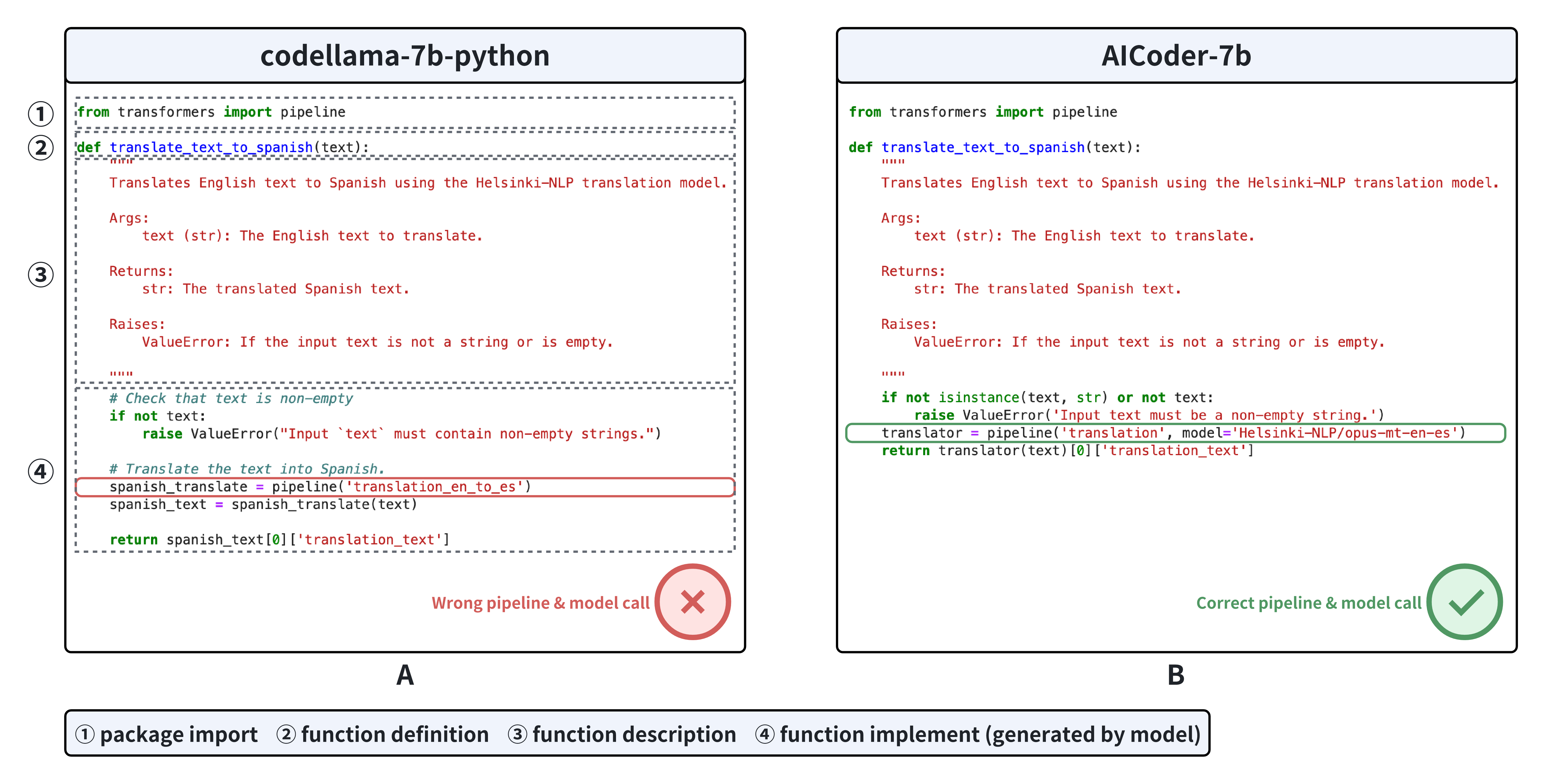AutoCoder: Enhancing Code Large Language Model with textsc{AIEV-Instruct}
2405.14906

0
0
💬
Abstract
We introduce AutoCoder, the first Large Language Model to surpass GPT-4 Turbo (April 2024) and GPT-4o in pass@1 on the Human Eval benchmark test ($mathbf{90.9%}$ vs. $mathbf{90.2%}$). In addition, AutoCoder offers a more versatile code interpreter compared to GPT-4 Turbo and GPT-4o. It's code interpreter can install external packages instead of limiting to built-in packages. AutoCoder's training data is a multi-turn dialogue dataset created by a system combining agent interaction and external code execution verification, a method we term textbf{textsc{AIEV-Instruct}} (Instruction Tuning with Agent-Interaction and Execution-Verified). Compared to previous large-scale code dataset generation methods, textsc{AIEV-Instruct} reduces dependence on proprietary large models and provides execution-validated code dataset. The code and the demo video is available in url{https://github.com/bin123apple/AutoCoder}.
Create account to get full access
This summary was produced with help from an AI and may contain inaccuracies - check out the links to read the original source documents!
Related Papers
📈
JumpCoder: Go Beyond Autoregressive Coder via Online Modification
Mouxiang Chen, Hao Tian, Zhongxin Liu, Xiaoxue Ren, Jianling Sun

0
0
While existing code large language models (code LLMs) exhibit impressive capabilities in code generation, their autoregressive sequential generation inherently lacks reversibility. This limitation hinders them from timely correcting previous missing statements during coding as humans do, often leading to error propagation and suboptimal performance. We introduce JumpCoder, a novel model-agnostic framework that enables human-like online modification and non-sequential generation to augment code LLMs. The key idea behind JumpCoder is to insert new code into the currently generated code when necessary during generation, which is achieved through an auxiliary infilling model that works in tandem with the code LLM. Since identifying the best infill position beforehand is intractable, we adopt an textit{infill-first, judge-later} strategy, which experiments with filling at the $k$ most critical positions following the generation of each line, and uses an Abstract Syntax Tree (AST) parser alongside the Generation Model Scoring to effectively judge the validity of each potential infill. Extensive experiments using six state-of-the-art code LLMs across multiple and multilingual benchmarks consistently indicate significant improvements over all baselines. Our code is public at https://github.com/Keytoyze/JumpCoder.
6/6/2024

AICoderEval: Improving AI Domain Code Generation of Large Language Models
Yinghui Xia, Yuyan Chen, Tianyu Shi, Jun Wang, Jinsong Yang

0
0
Automated code generation is a pivotal capability of large language models (LLMs). However, assessing this capability in real-world scenarios remains challenging. Previous methods focus more on low-level code generation, such as model loading, instead of generating high-level codes catering for real-world tasks, such as image-to-text, text classification, in various domains. Therefore, we construct AICoderEval, a dataset focused on real-world tasks in various domains based on HuggingFace, PyTorch, and TensorFlow, along with comprehensive metrics for evaluation and enhancing LLMs' task-specific code generation capability. AICoderEval contains test cases and complete programs for automated evaluation of these tasks, covering domains such as natural language processing, computer vision, and multimodal learning. To facilitate research in this area, we open-source the AICoderEval dataset at url{https://huggingface.co/datasets/vixuowis/AICoderEval}. After that, we propose CoderGen, an agent-based framework, to help LLMs generate codes related to real-world tasks on the constructed AICoderEval. Moreover, we train a more powerful task-specific code generation model, named AICoder, which is refined on llama-3 based on AICoderEval. Our experiments demonstrate the effectiveness of CoderGen in improving LLMs' task-specific code generation capability (by 12.00% on pass@1 for original model and 9.50% on pass@1 for ReAct Agent). AICoder also outperforms current code generation LLMs, indicating the great quality of the AICoderEval benchmark.
6/10/2024

Automatic Instruction Evolving for Large Language Models
Weihao Zeng, Can Xu, Yingxiu Zhao, Jian-Guang Lou, Weizhu Chen

0
0
Fine-tuning large pre-trained language models with Evol-Instruct has achieved encouraging results across a wide range of tasks. However, designing effective evolving methods for instruction evolution requires substantial human expertise. This paper proposes Auto Evol-Instruct, an end-to-end framework that evolves instruction datasets using large language models without any human effort. The framework automatically analyzes and summarizes suitable evolutionary strategies for the given instruction data and iteratively improves the evolving method based on issues exposed during the instruction evolution process. Our extensive experiments demonstrate that the best method optimized by Auto Evol-Instruct outperforms human-designed methods on various benchmarks, including MT-Bench, AlpacaEval, GSM8K, and HumanEval.
6/4/2024

AgentCoder: Multi-Agent-based Code Generation with Iterative Testing and Optimisation
Dong Huang, Jie M. Zhang, Michael Luck, Qingwen Bu, Yuhao Qing, Heming Cui

0
0
The advancement of natural language processing (NLP) has been significantly boosted by the development of transformer-based large language models (LLMs). These models have revolutionized NLP tasks, particularly in code generation, aiding developers in creating software with enhanced efficiency. Despite their advancements, challenges in balancing code snippet generation with effective test case generation and execution persist. To address these issues, this paper introduces Multi-Agent Assistant Code Generation (AgentCoder), a novel solution comprising a multi-agent framework with specialized agents: the programmer agent, the test designer agent, and the test executor agent. During the coding procedure, the programmer agent will focus on the code generation and refinement based on the test executor agent's feedback. The test designer agent will generate test cases for the generated code, and the test executor agent will run the code with the test cases and write the feedback to the programmer. This collaborative system ensures robust code generation, surpassing the limitations of single-agent models and traditional methodologies. Our extensive experiments on 9 code generation models and 12 enhancement approaches showcase AgentCoder's superior performance over existing code generation models and prompt engineering techniques across various benchmarks. For example, AgentCoder (GPT-4) achieves 96.3% and 91.8% pass@1 in HumanEval and MBPP datasets with an overall token overhead of 56.9K and 66.3K, while state-of-the-art obtains only 90.2% and 78.9% pass@1 with an overall token overhead of 138.2K and 206.5K.
5/27/2024